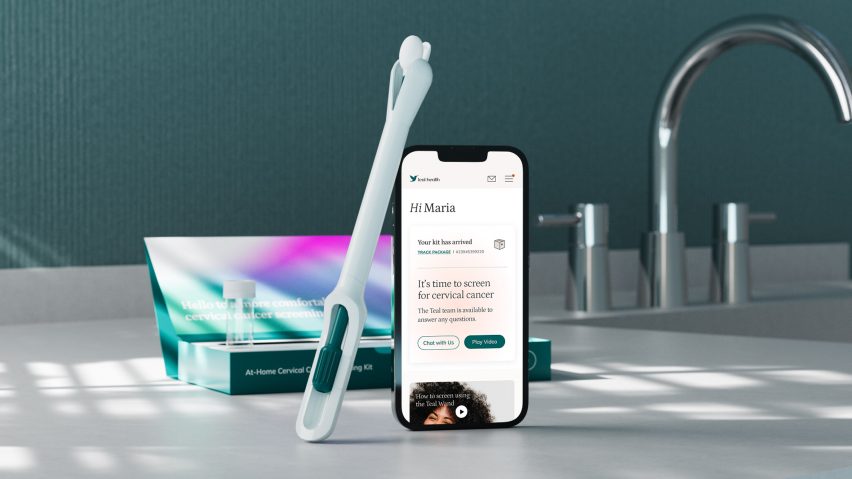Design studio IDEO has created a device for healthcare startup Teal Health that enables women to self-collect samples required for cervical cancer screening in the privacy and comfort of their own homes.
Teal Health's cancer screening service is based around its Teal Wand device, which the US company said enables people "to easily, comfortably and confidently collect their own vaginal sample".
The proprietary device developed in collaboration with design agency IDEO allows the sample to be collected at home or a local health clinic, removing the need for invasive exams.
Teal Wand is based on a prototype created by doctor Avnesh Thakor, who co-founded Teal Health with marketing specialist Kara Egan to help ensure all women and people with a cervix are screened for cervical cancer.
Egan said she was motivated to start Teal Health to make it easier for women to access healthcare without taking time out to visit a doctor's office.
"For me, the Teal Health at-home screening is a way to welcome a woman back into her healthcare," she told Dezeen.
"This experience of screening at home is meant to build a relationship with a woman through every aspect of the experience – from ordering the screening to opening the box, collecting a sample and learning of our results."
Cervical cancer is one of the most preventable cancers, so long as people are regularly screened to check for the presence of high-risk HPV (human papillomavirus) that occurs before the cancer develops.
The standard method of screening, known as a Pap smear or smear test, is typically conducted by a doctor using stirrups, a speculum and a hard plastic sampling brush.
Teal Health wanted to develop a more private and less intrusive way of collecting a sample and called on IDEO to help develop an intuitive and comfortable product inclusive of all body types.
"Most people would not be able to identify what a cervix looks like or where their cervix is, let alone try to collect very particular cells from that part of the anatomy without contamination," said IDEO senior design director Jason Robinson.
"When Kara first told us about the brief, that's the first thing that came to mind – you're asking us to find a way for people to do all that while blind and one-handed? Sure – let's do it!"
Teal Wand's design is based on feminine products such as tampons, with which users are likely already familiar. Its profile follows that of a standard tampon and the handle enables the process to be carried out one-handed and ambidextrously.
"We added a lengthened handle to make the device easier to manoeuvre, and a unique slider knob that makes it possible to use the thumb to deploy a sponge, which rolls to collect the cells from an opening in the cervix known as the os," Robinson explained.
Once the sample has been collected, the sponge retracts back into the main body before the device is removed. The user then posts the Teal Wand to a lab where the sample is analysed using the same methods as current tests.
A dedicated Teal Medical Practice portal will communicate test results and offer direct access to women's health providers and the opportunity to secure follow-up care if required.
"Teal's approach is holistic, prioritising both the physical and emotional well-being of women throughout their healthcare journey," said Egan.
"This includes the design of the wand itself, the thoughtful reminders and support systems in place, and the way results are communicated, emphasising both empathy and education."
According to Teal Health, studies involving more than 800 participants showed that women were able to collect an adequate sample using the Teal Wand, with 97 per cent saying it was easy or very easy to use.
The same studies indicated that 94 per cent of women would choose to self-collect samples over the current standard procedure, while 87 per cent said they would be more likely to get screened if Teal Wand were an option.
The Teal Wand has been granted Breakthrough Device status by the US Food and Drug Administration (FDA), which places it on an accelerated path to market. It is currently undergoing clinical trials, with the final study to be submitted to the FDA soon.
Global design and innovation company IDEO regularly collaborates with industry clients to develop products, services, brands and experiences. Its other projects include a vision for a shared self-driving car, a suspension lamp formed of multiple adjustable rings and a guide to help businesses design for the circular economy.

